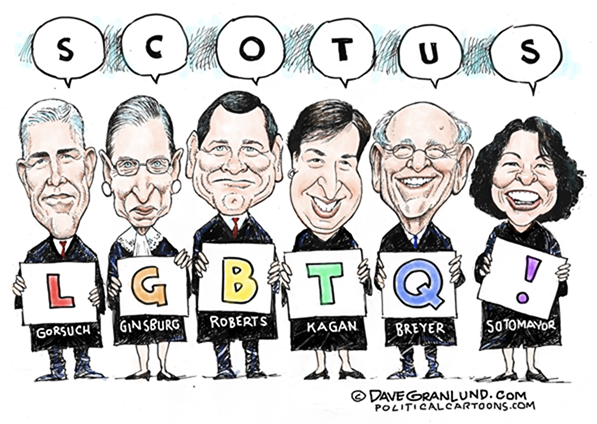In a 6-3 June 15 SCOTUS (U.S. Supreme Court case number 17-1618) decision, workplace civil rights “protections” were extended to include approximately 8 million LGBTQ individuals.
This is huge, momentous. The surprise is that two arch conservative justices joined four liberal, progressive justices to grant protections for gay, lesbian, queer and transgender employees.
The majority said that discrimination based on sex, which has been illegal as part of the historic Civil Rights Act of 1964, Title VII (pertaining to employment), now applies also to LGBTQ people. Discriminating against their homosexuality or transgender status is basing the mistreatment on sex.
Gays and transgender folks are now deemed members of a “protected status group.” Employers now have to be careful to not treat them differently than workers with a different sexual orientation. The ruling, making it the law of the land, puts LGBTQ discrimination cases on par with sexual harassment cases. Employers dare not treat them with indifference.
This group has deserved this designation forever, but in unenlightened America laws and the courts rarely reflect progress. Same-sex marriage approval was also a shocking SCOTUS decision from a couple of years ago. Employment law, however, lags far behind societal changes.
Here are some excerpts from the decision itself:
The Starting Point
Title VII makes it “unlawful . . . for an employer to fail or refuse to hire or to discharge any individual, or otherwise to discriminate against any individual . . . because of such individual’s race, color, re- ligion, sex, or national origin.” 42 U. S. C. §2000e–2(a)(1).
But-For Causation
The parties concede that the term “sex” in 1964 referred to the biological distinctions between male and female. And “the ordinary meaning of ‘because of’ is ‘by reason of’ or ‘on account of,’ … That term incorporates the but-for causation standard, … which, for Title VII, means that a defendant cannot avoid liability just by citing some other factor that contributed to its challenged employment action.
About Intentionality
Because discrimination on the basis of homosexuality or transgender status requires an employer to intentionally treat individual employees differently because of their sex, an employer who intentionally penalizes an employee for being homosexual or transgender also violates Title VII. There is no escaping the role intent plays: Just as sex is necessarily a but-for cause when an employer discriminates against homosexual or transgender employees, an employer who discriminates on these grounds inescapably intends to rely on sex in its decision-making.
Precedent Cases Undercut Employers’ Excuses
First, it is irrelevant what an employer might call its discriminatory practice, how others might label it, or what else might motivate it … Second, the plaintiff’s sex need not be the sole or primary cause of the employer’s adverse action … Finally, an employer cannot escape liability by demonstrating that it treats males and females comparably as groups.
A Common Sense Illustration
Consider, for example, an employer with two employees, both of whom are attracted to men. The two individuals are, to the employer’s mind, materially identical in all respects, except that one is a man and the other a woman. If the employer fires the male employee for no reason other than the fact he is attracted to men, the employer discriminates against him for traits or actions it tolerates in his female colleague. Put differently, the employer intentionally singles out an employee to fire based in part on the employee’s sex, and the affected employee’s sex is a but-for cause of his discharge. Or take an employer who fires a transgender person who was identified as a male at birth but who now identifies as a female. If the employer retains an otherwise identical employee who was identified as female at birth, the em- ployer intentionally penalizes a person identified as male at birth for traits or actions that it tolerates in an employee identified as female at birth. Again, the individual employee’s sex plays an unmistakable and impermissible role in the discharge decision.
However, An Alarming Preview of Future Cases
So while other employers in other cases may raise free exercise arguments that merit careful consideration, none of the employers before us today represent in this Court that compliance with Title VII will infringe their own religious liberties in any way.
The entire majority telling the good news took only 33 pages, including the introductory Summary. Justice Alito dissented and took 54 pages to share his discontent, along with an additional 53 pages of Appendices to support his thinking. Then, Justice Kavanaugh, he with the sexual assault history, spread his dissent over 28 pages.
#######
For those who care to read the SCOTUS decision and two dissents, here is the link to the pdf document.


